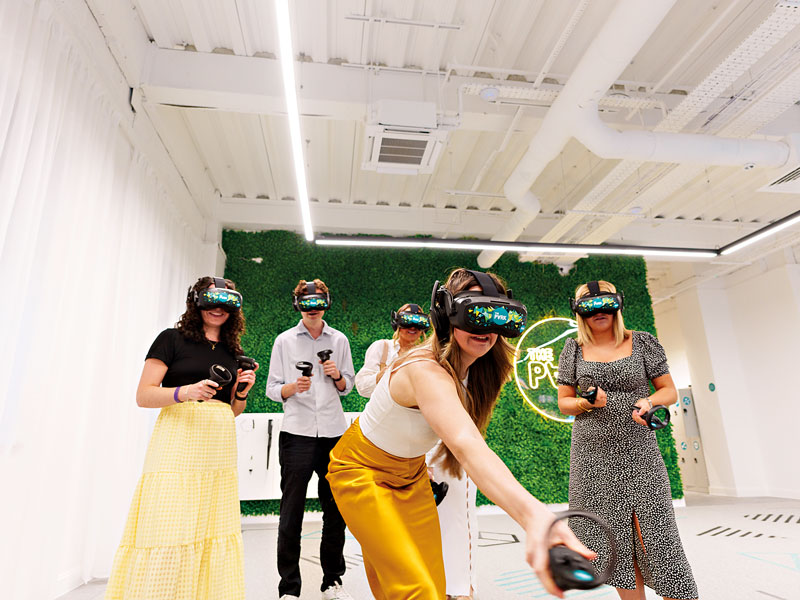
Today’s business leaders and consumers alike are facing turbulent economic times. The goal of any business is to be profitable but there is no doubt that several recent world events have made it incredibly difficult for some. Amid these challenges, businesses are striving for growth in 2024 but to do so requires the prioritisation of customer satisfaction.
Across the leisure industry, businesses ranging from hospitality through to theme parks have to adapt their ROI models to rapidly changing guest expectations. Today’s consumers want shared entertainment experiences that offer something unique every time. To meet these high expectations, the leisure industry landscape has morphed by merging two previously separate worlds: food & beverage leisure and play & entertainment leisure.
The booming experience economy
Recently, Millennials and Gen Zers have continued to drive the experience economy by spending more on memorable experiences over material possessions, and their expectations for high-quality entertainment-led, social experiences have grown rapidly. A recent Europe-wide study indicates that this trend among the ‘experience generation’ is likely to continue. In fact, 88 percent of those surveyed planned to prioritise spending the same or more on experiences in 2024 (compared to 2023). The study also reveals that among the top reasons for booking an experience is to socialise with friends and family, while food-related or family experiences were among the top experiences of choice. These findings show that investing in delivering high-quality shared experiences is crucial to drive business growth and maintain competitive advantage.
While the experience economy has been in place for a long time, there are a few key factors for its recent evolutions. Following the pandemic we have seen more and more businesses in the leisure industry merge with social activities. Supply chains disrupted during Covid continue to be impacted by an increased cost of materials forcing operators to re-evaluate the profitability of their current business models. In addition, people emerged from lockdown with a new appreciation and desire for spending time with friends and family, and experiencing new and exciting events. These factors have given rise to ‘eatertainment,’ a concept born out of the collision of two leisure sectors – food & beverage and play & entertainment – that is both mutually beneficial to businesses and meets visitors’ needs.
Learning from industry advancements
Businesses across the industry globally have recognised the importance of focusing on the entire visitor journey. Disneyland Paris Resort, for example, recently announced a huge investment to reimagine the entire guest experience from entertainment to dining and shopping. Similarly, mega developments in the Middle East, such as Qiddiya in Saudi Arabia are integrating entertainment, food and sports into one destination, delivering fresh experiences to guests every time they visit.
Businesses can take valuable insights from these developments by considering how to bring together multiple aspects to create a must-see destination. With guest expectations higher than ever, many businesses are turning to immersive technologies like mixed reality (MR) to meet the demand.
MR technology has hit a level of maturity and is more reliable and accessible both from a usability and an economic point of view, compared to just a few years ago. Additionally, MR can transform spaces into countless fantastical immersive worlds for groups, delivering the kind of social, entertainment-led experiences that visitors want.
Perfect harmony
Here are a few key considerations for any business trying to achieve the delicate balance of delivering high-quality guest experiences with profitability. It’s clear that today’s audiences value meaningful, social, entertainment-led experiences so individual digital experiences are going to become less popular than they have been previously. Operators should aim to nurture both entertainment and social aspects equally in available experiences. Audiences want the freedom of choice. It’s important for businesses to build a diverse content library that appeals to all ages and interests and provides guests with the flexibility to choose a different experience each time they visit. Consider integrating newer technologies, such as immersive VR, to make experiences more engaging, interactive and personalised so that it’s different every time it is played. And this doesn’t have to be costly; turnkey solutions can see a return on your investment quickly without the financial upheaval of building solutions yourself.
Balancing customer satisfaction with ROI is an ongoing journey. For the leisure industry, the answer is very much about combining worlds: eating and entertainment, the real and the imagined, the physical and the virtual. By embracing guest experience as a priority and using emerging technologies like immersive VR to meet guest expectations, businesses can navigate the challenging economic landscape with greater confidence.


